According to Stack Overflow’s annual Developer Survey (the largest survey of coders globally), Python is the fastest-growing programming language today. It’s the fourth most popular (after SQL, but before R), the second most loved one (right after Rust), and the most wanted one (meaning that developers that don’t yet use it want to learn it).
Python’s popularity isn’t surprising. It’s one of the easiest programming languages you can learn. It has simple, clean syntax (it was actually started as a side project by the Dutch programmer Guido van Rossum after he grew frustrated by the shortcomings of existing programming languages) and excellent library support. It’s also incredibly versatile — it’s used in data science, machine learning, web development, product development, and testing. You’ve likely seen Python at work without even realizing it. Wikipedia, Quora, and NASA are just a handful of organizations that use Python.
Because it’s so popular, the demand for Python developers far exceeds supply. At the time of writing, there are 54,964 Python jobs listed on Indeed.com and 51,167 on Glassdoor.com. And where there’s demand, there’s a lot of money to be made. The average Python developer salary in the U.S. is $120,000 a year. Even an entry-level Python developer can make a decent wage: $74,435 per year.
Regardless of whether you want to learn Python to grow your career or because you’ve heard that programming in Python is incredibly fun (it is), here’s a list of ten of the best Python courses to learn Python online.
These are the best Python courses you can take online.
Best Python Courses
Best Overall: Python for Everybody (Coursera x University of Michigan)
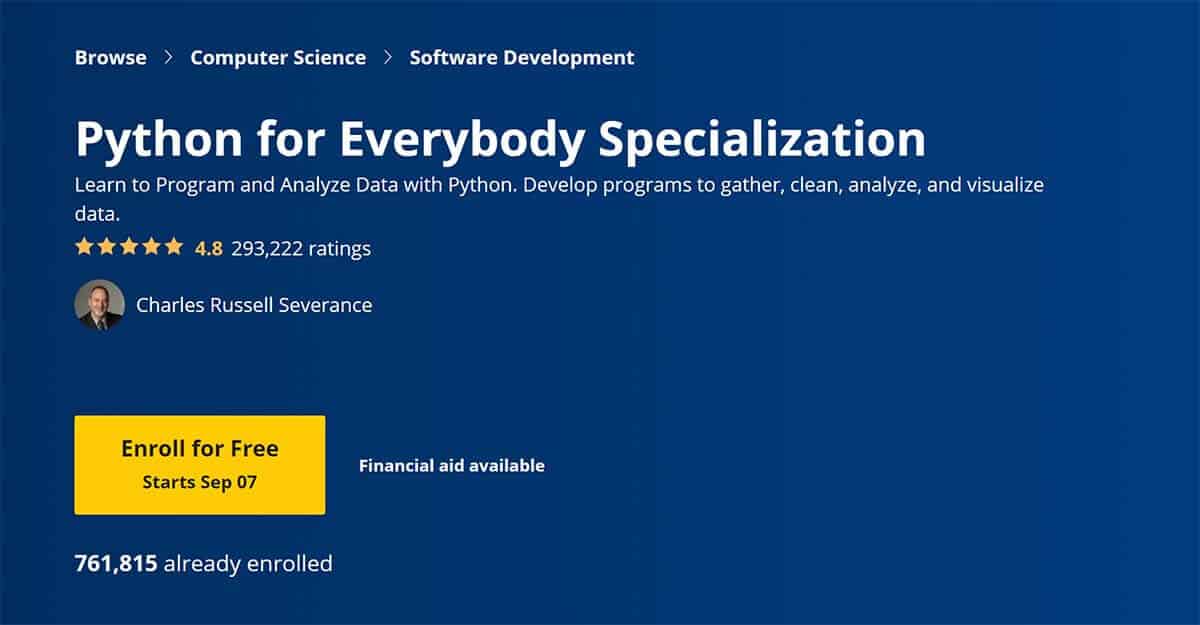
40% ($140 USD) off your first year of Coursera Plus Annual (expires 2 December 2024)
- Past computer science experience unnecessary
- Easy to understand and follow
- Official certification from UMich
- 7-day free trial available
- All students complete a large capstone project
Cons
- Time-intensive syllabus
Offered by the University of Michigan and available on Coursera, “Python for Everybody” is hands down the best Python course for those without experience in any programming language. The course instructor, Professor Charles Severance, breaks down all the complex concepts you’re likely to encounter when programming in Python while providing plenty of fun exercises.
The program is divided into five courses. Professor Severance imparts his knowledge to students via video tutorials, readings, and practice exercises.
To pass each lesson, students must complete an auto-graded quiz and at least one peer-reviewed assignment. The course ends with a capstone section consisting of several projects.
This program suggests that you dedicate about three hours a week to learning Python, in which case you can finish all the courses in about eight months. However, according to past students, if you put your mind to it, you can complete the entire program in just a few days.
If learning coding seems like a daunting task to you, this Python tutorial is for you. Professor Severance makes learning Python so fun that one of his past students actually said that “each week feel[s] like an approachable game.” For the reasons listed above, we consider this to be the best overall online Python class.
Best for Intermediate Python Users: Intermediate Python Nanodegree (Udacity)
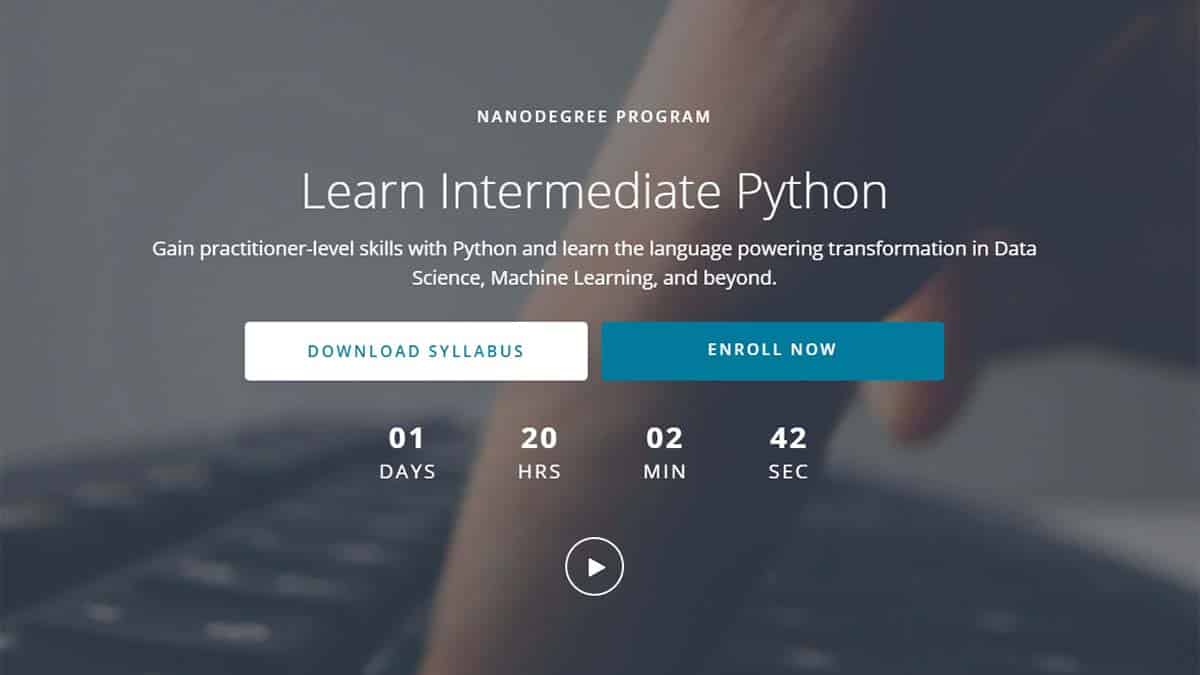
- Two large-scale student projects included in syllabus
- Great for building a programming portfolio
- Career support services includes in price
- Includes access to a network of code reviewers and mentors
Cons
- Requires a basic understanding of Python concepts
For building a career in technology and/or programming, one of our favorite e-learning platforms is Udacity. There are a couple of good reasons for that.
For one, Udacity places strong emphasis on student portfolios and helping their students develop real-world practical projects.
Also, extra career services such as CV, Github, and LinkedIn profile optimization are included in the price of the course. You might be surprised by how important something like the content in your LinkedIn profile can be when it comes to job-seeking.
This “Intermediate Python” Nanodegree is an excellent example of a well-structured online training program. Within a short 2-month curriculum, students are guided through the process of creating two large-scale student projects, and the syllabus has a good mix of theoretical and practical lessons.
As this is an advanced-level course, the syllabus skips most of the basics and goes straight into advanced concepts such as object-oriented programming, functional design, advanced functions, deploying web applications, and more. By the end, your skills will include fusing external files together so that they work towards a common goal.
If you’d like to take this online course but you lack the prerequisite knowledge needed, consider enrolling in Udacity’s beginner-level “Intro to Programming” Nanodegree instead. It’s just as good, albeit less advanced.
Best Free Course: Python 3 - A Beginner’s Guide to Python Programming (Skillshare)
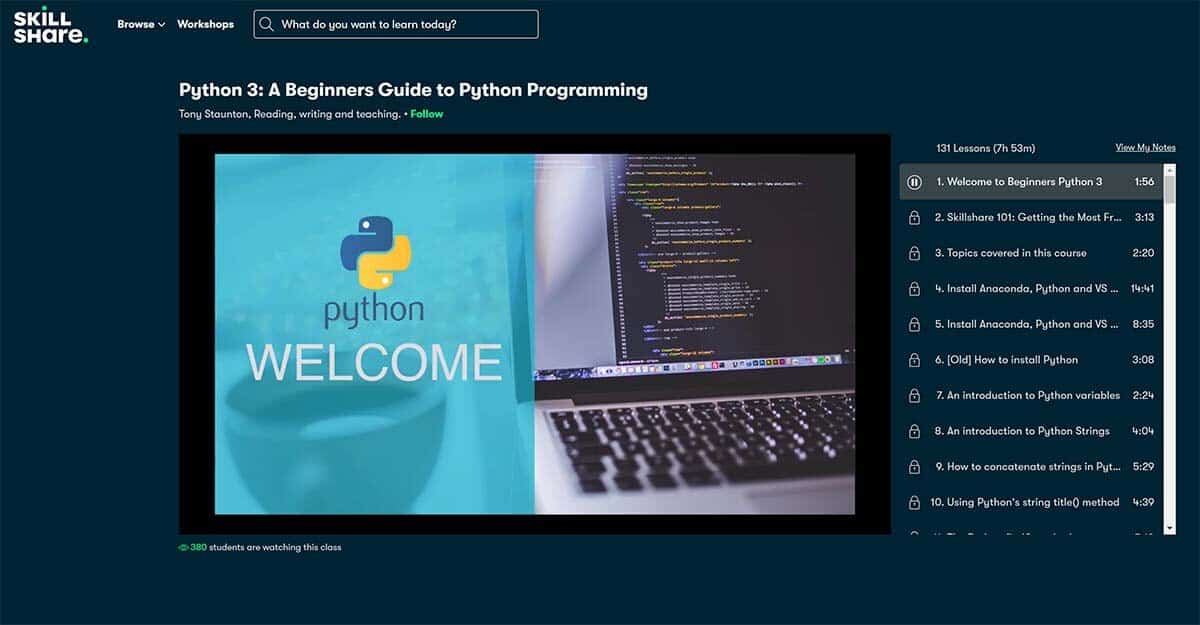
Get 30% off of a Premium Skillshare Membership
Test Skillshare for free with no-questions-asked cancellation: 30-day free trial
- Short, easy-to-digest modules
- Free if completed within Skillshare's 30-day trial
- Monthly challenges
- Computer science experience unnecessary
Cons
- Very brief
Great for beginners who might be short on time, “Python 3: A Beginner’s Guide to Python Programming” is an eight-hour course that walks you through some of the most important concepts in the Python 3 programming language, including variables, conditional tests, and dictionaries.
Although the course is made up of 131 video lessons, you’re unlikely to feel overwhelmed. That’s because each lesson is relatively short (the longest one is fifteen minutes long).
But what’s the point of learning something if you can’t put it into practice? Luckily, the course instructor, Tony Staunton, understands this, which is why he gives examples of where each code can be used in real-life situations.
He also periodically shares new projects and monthly challenges with his students. For example, in April this year, he posted a challenge that required students to build a text-based adventure game.
With this course from Skillshare, you can learn Python anytime, anywhere, on any device. No more staring out the window aimlessly on your commute! In just under eight hours, you’ll go from a complete newbie who doesn’t even know how to install Python to knowing how to create your own Python programs.
Complete Python Bootcamp: From Zero to Hero In Python (Udemy)

New customer offer! Top courses from $14.99 when you first visit Udemy (expires 31 March 2024).
- Beginner-friendly
- Comes with coding exercises and 3 projects
- Certificate of completion
- 30-day money-back guarantee
Cons
- Some key concepts are glossed over
Udemy’s “2022 Complete Python Bootcamp: From Zero to Hero In Python” is a 22-course program. It covers more or less everything you need to know to get started with programming in Python, including concepts like functions, loops, and object-oriented programming.
The curriculum is taught via video lessons, readings, and coding exercises. Since every lecture has a corresponding code notebook maintained in Jupyter notebook format, students also learn the Jupyter system.
Included in the program are three milestone projects. These are fun but challenging, which means that you’ll likely need to Google a thing or two to complete them. That being said, every project comes with a solution section.
There are no prerequisites for enrolling in this program. You don’t even need to know how to code. Nevertheless, the program is fast-paced enough for intermediate developers, too.
There’s a reason why this is a top Python course. It offers full-lifetime access, course material that is updated almost monthly, and a certificate of completion. More than one million students have taken this program so far. Judging by their reviews, most of them loved it.
Python Programmer (DataCamp)
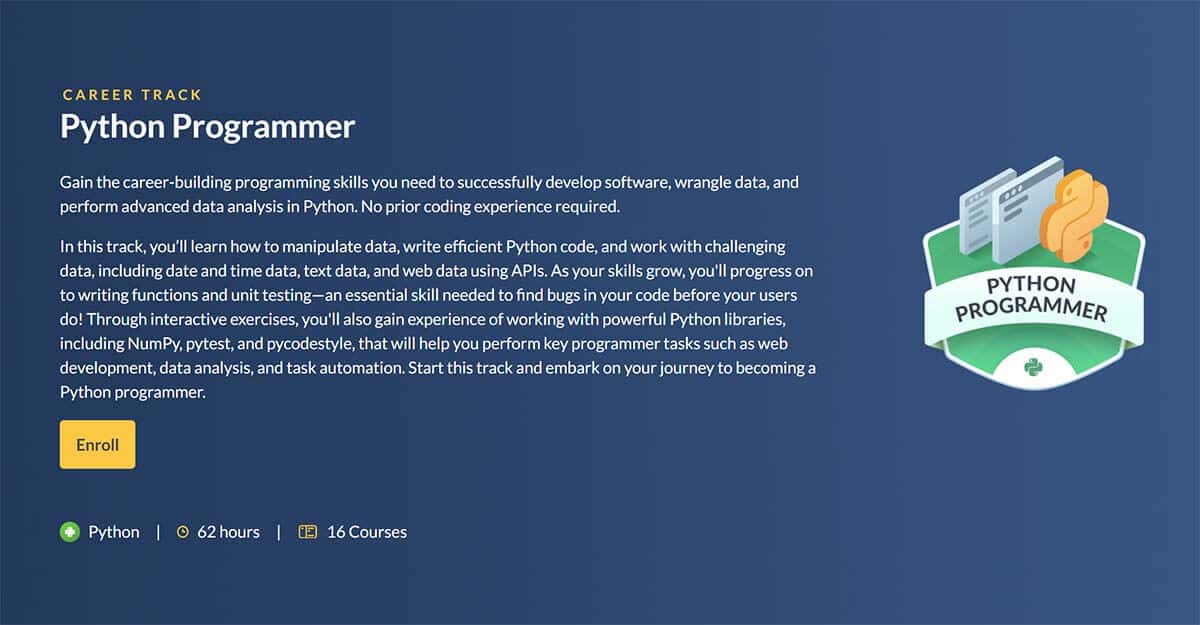
50% off Unlimited Data and AI Learning (expires 28 March 2024)
- A collection of courses
- Well-structured course syllabus
- A ton of hands-on exercises
- First section of every course is free
Cons
- Some of the exercises are too easy
The “Python Programmer Career Track” is a collection of 16 Python courses selected by industry professionals to help you grow your skills. The track starts with introductory courses that cover basic skills (i.e., the syntax of Python) and ends with more advanced topics.
Each course is broken down into three to five sections, which consist of smaller topics, or “chapters.” Every chapter has a short introductory video followed by a series of exercises that run in your browser and use real-world datasets.
When you complete an exercise, you gain experience points. You can use these points to see hints for any future exercises you may get stuck on. However, that probably won’t be necessary as all of the exercises come with skeleton code, which means that all you have to do is fill in the blanks.
There are no requirements for getting started with this career track. Because each course is four hours long, the entire track should take you about 62 hours to complete.
The Python Programmer Career Track will teach everyone something new, regardless of whether they’re a total beginner or an intermediate Python learner. Still not 100% sure whether this program is for you? You can try the first section of each course for free.
Python Fundamentals Skill Track (DataCamp)
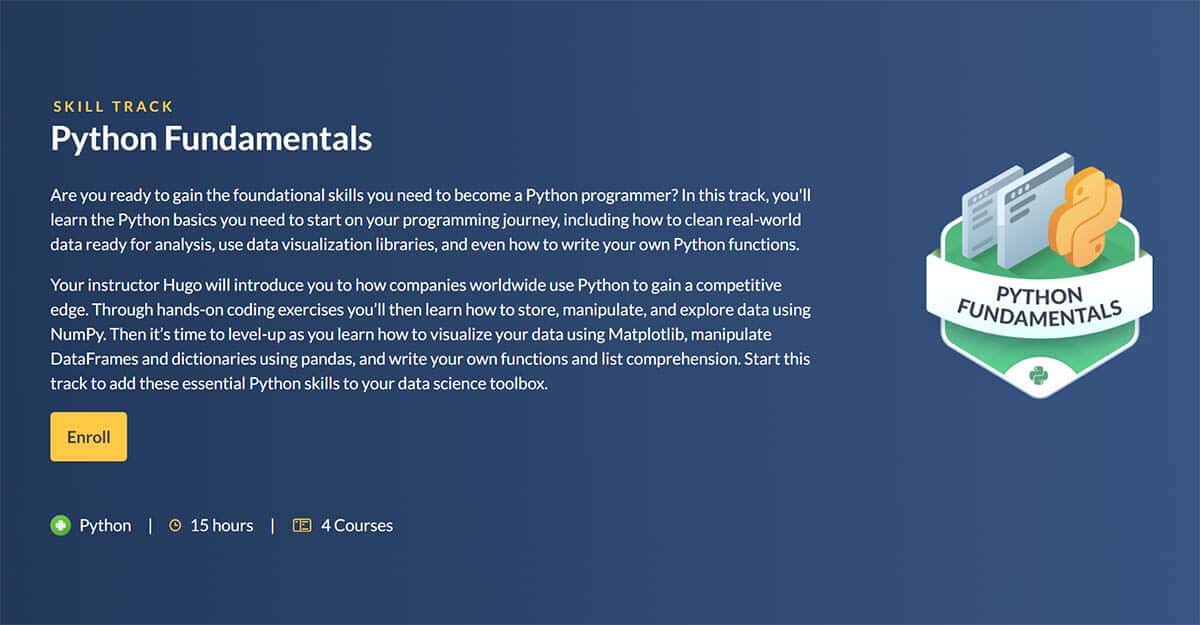
50% off Unlimited Data and AI Learning (expires 28 March 2024)
- 4 courses in one
- Interactive Python exercises
- Covers Python basics in only 15 hours
- First chapter of each course is free
Cons
- Too much hand-holding at times
The “Python Fundamentals Skill Track” on DataCamp consists of four courses that are between three to four hours long, which means that you can gain the foundational skills you need to code in Python in just 15 hours.
The video lessons go over things like how to clean and prep data, use data visualization libraries such as NumPy, and write your own Python functions.
However, the best thing about this track (and other tracks and courses on DataCamp) is the user interface. It’s intuitive and easy to use, and the exercises (of which there are plenty) can be accomplished using the built-in Python console. As such, students don’t have to install any additional software, which is always a big plus.
Don’t worry about messing up when it comes to the exercises. This course doesn’t expect you to write your own code, at least not yet. Instead, you’ll need to fill in the blanks. If even that’s too difficult for you, you can ask for a hint or see the full answer.
DataCamp’s Python Fundamentals Skill Track does a great job of introducing the basic principles of Python. The goal here is not to turn you into an expert, but rather, to give you a taste of what you need to get started.
AI Programming with Python (Udacity)
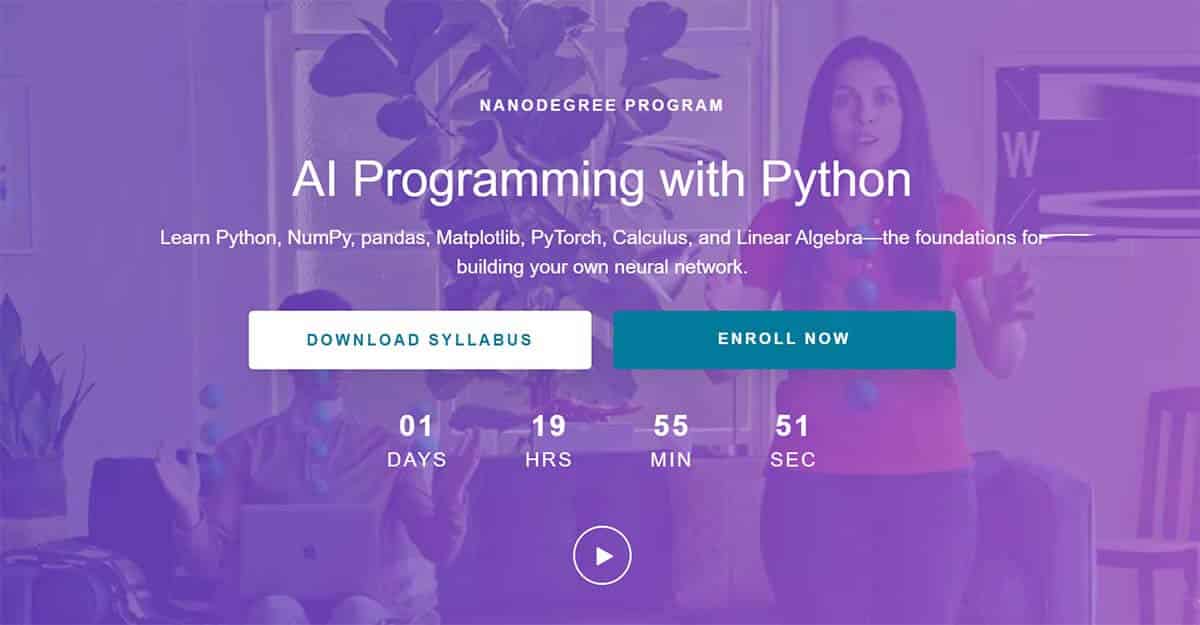
- Courses on Python, foundational AI, and math skills
- 2 real-world projects
- Unlimited project feedback
- Career coaching services included
Cons
- Higher cost than some of the other options
The “AI Programming with Python” nanodegree on Udacity will give you a solid background in math, Python, and deep learning, which in turn will help you get started in the field of artificial intelligence or machine learning.
While the core focus of this nanodegree is on Python, you also get to study algebra, calculus, and neural networks.
There are two projects: one at the end of the first course (which involves using a pre-trained image classifier to identify dog breeds) and one at the end of the fifth course (where you build your own image classifier). Projects are graded by experienced reviewers who provide unlimited feedback.
Students that spend about 10 hours a week on this program can expect to finish it in about three months. Prerequisites are minimal: foundational algebra and coding knowledge in any programming language. However, note that while the lessons start at the beginner level, they accelerate quite quickly.
Although on the expensive side, this nanodegree has it all: custom study plans, real-world projects, and an active student community. Even better, the program also includes career support in the form of interview preparation, cover letter and resume services.
Programming for Everybody (Getting Started with Python) (edX x University of Michigan)
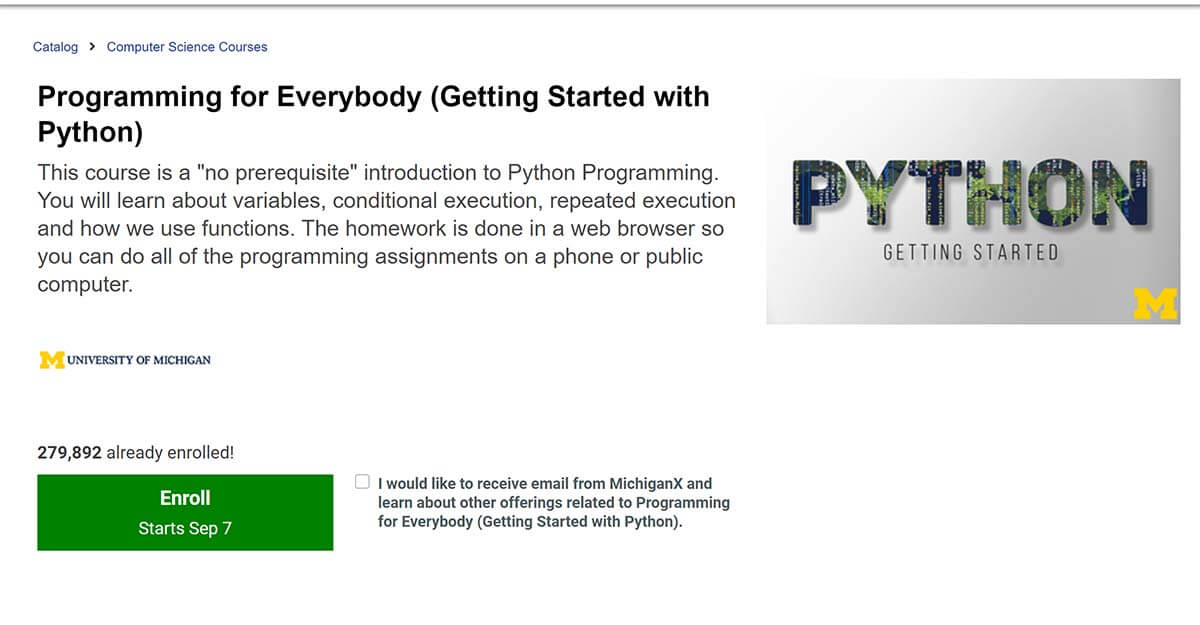
- University of Michigan course
- No prerequisites
- Includes a free PDF version of Professor Severance’s book
- Many assignments
- Free to audit
Cons
- Full access and certificate only for paying students
Taught by Professor Charles Severance of the University of Michigan, “Programming for Everybody (Getting Started with Python)” is a five-chapter course available on edX. The course promises to teach you how to build a program from a series of straightforward instructions in Python while avoiding “all but the simplest mathematics.”
Since the course is based on chapters one to five of Professor Severance’s textbook, “Python for Everybody: Exploring Data Using Python 3,” students who enroll in this course automatically get access to a PDF version of this book (in addition to video lessons and assignments).
It’s evident that Professor Severance has a lot of experience working with first-time coders as he can predict the kind of mistakes they’re likely to make and the type of questions they’re likely to ask. Moreover, unlike some lecturers, he is fun to listen to, so there’s no chance that you’ll fall asleep while watching his Python tutorials.
Students that spend between two to four hours learning Python every week should have no trouble completing this course in about seven weeks.
There’s no doubt about it, Programming for Everybody (Getting Started with Python) is a superb Python tutorial for beginners. And it’s free to audit. However, you’ll need to upgrade to the premium version of the course for unlimited access and graded assignments.
The Python Bible | Everything You Need to Program In Python (Udemy)

New customer offer! Top courses from $14.99 when you first visit Udemy (expires 31 March 2024).
- Under 10 hours long
- 11 coding exercises
- Brisk pace
- No prerequisites
Cons
- Final section feels rushed
The “Python Bible | Everything You Need to Program In Python” on Udemy is a 10-hour program that’s quick and to the point, moving from one topic to the next at a reasonable pace.
The course is made up of 11 sections, which are further divided into 74 lectures. The curriculum is taught mainly through video lessons, which cover some of the most crucial Python concepts like variables, logic and data structures, and object-oriented programming (OOP).
Video lessons aside, students also gain access to 4 articles, 3 downloadable resources, and 11 coding exercises. As you progress through the course, the exercises get more complex. Although the instructor has purposely left out solutions, to challenge students, you can ask for help via the Q&A section.
The Python Bible is super easy to follow even if you’ve absolutely no coding knowledge. It helps that the instructor is encouraging and motivating, which means that you get to finish each lesson feeling like you’ve accomplished something significant.
Data Scientist with Python (DataCamp)
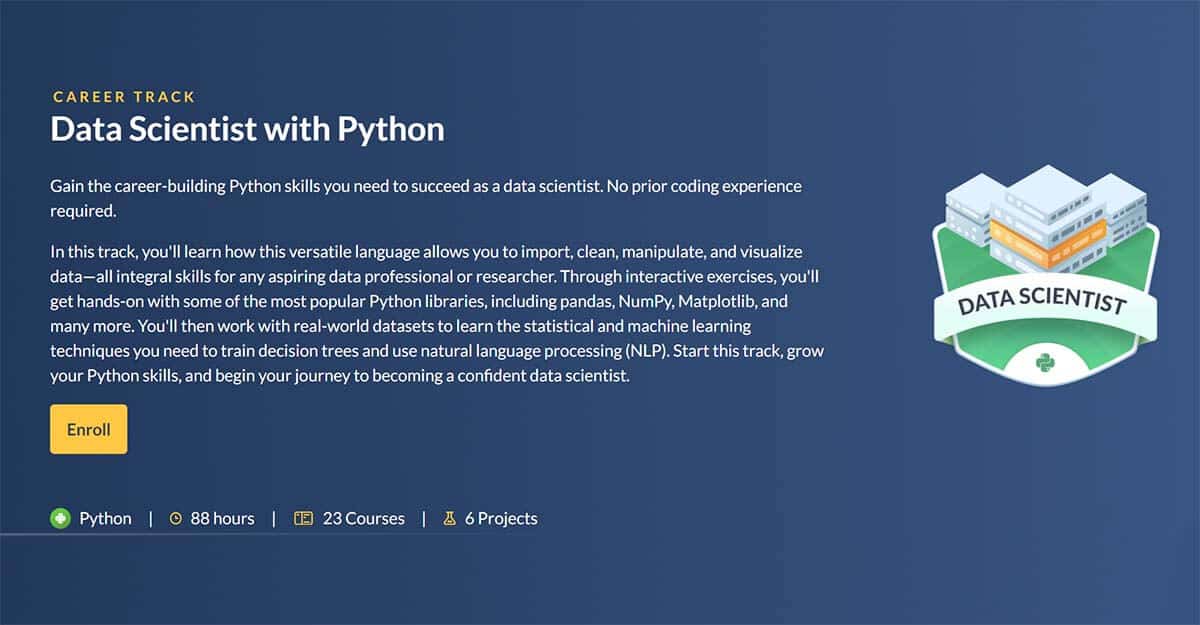
50% off Unlimited Data and AI Learning (expires 28 March 2024)
- 23 courses in one
- Covers both basic and advanced topics
- A lot of practice-based projects
- Hands-on, dashboard-based exercises
Cons
- Time intensive at 90 hours of material
Kickstart your career in data science with DataCamp’s “Data Scientist with Python,” a career track that comprises as many as 23 courses curated by data science experts and taught by 16 instructors.
As you progress through the track, the courses increase in difficulty. So, if you already have some knowledge of Python, you can skip ahead to the more complex topics.
The really cool thing about this track is that it comes not only with short videos and interactive dashboard-based exercises but also plenty of projects. Some of them ask you to clean and visualize data, whereas others expect you to create your own machine learning models.
Since each course is between 3 and 4 hours long, you can get through the entire track in just under 90 hours (plus the time you’ll need to complete the projects).
Go from Python newbie to pro with DataCamp’s Data Scientist with Python career track. Learn not only how to clean and visualize data and use Python libraries like NumPy and Matplotlib but also how to use machine learning techniques to train decision trees.
FAQs
🤔 What is the best way to learn Python?
The best way to learn Python online is to install Python on your laptop and start coding! However, if you’ve no idea where to start and would like a little direction, you should invest in a top Python course (we’ve rounded up ten of the best Python courses for 2020).
💢 Is Python easy or difficult to learn?
Most people find Python very easy to learn. It has an easy-to-understand syntax, is flexible, and has a large community. For this reason, Python is typically the first programming language that people who enter into the world of coding learn.
🙋♂️ Why is it worth to learn Python?
The main reason Python is worth learning is that it’s incredibly versatile. It’s used in scientific and numeric computing, web and software development, and building e-commerce systems.



